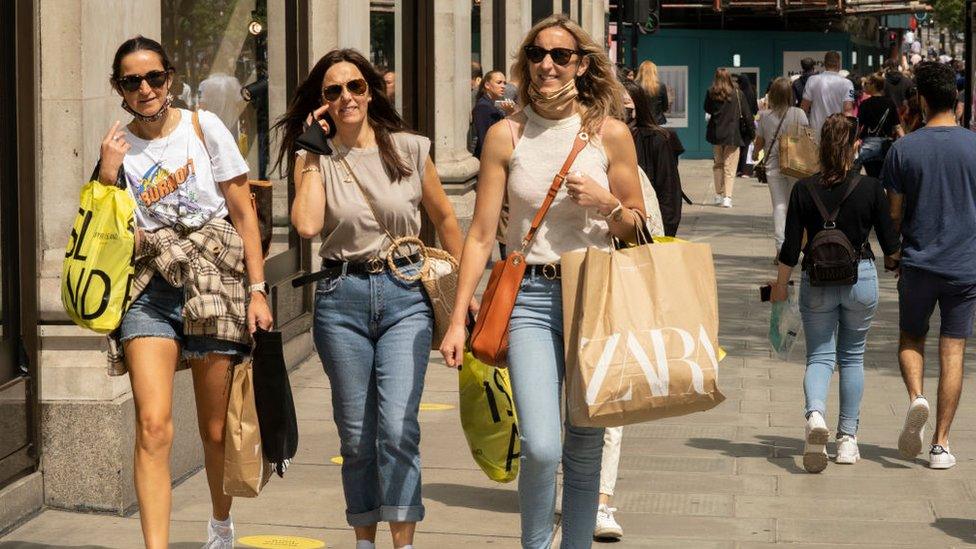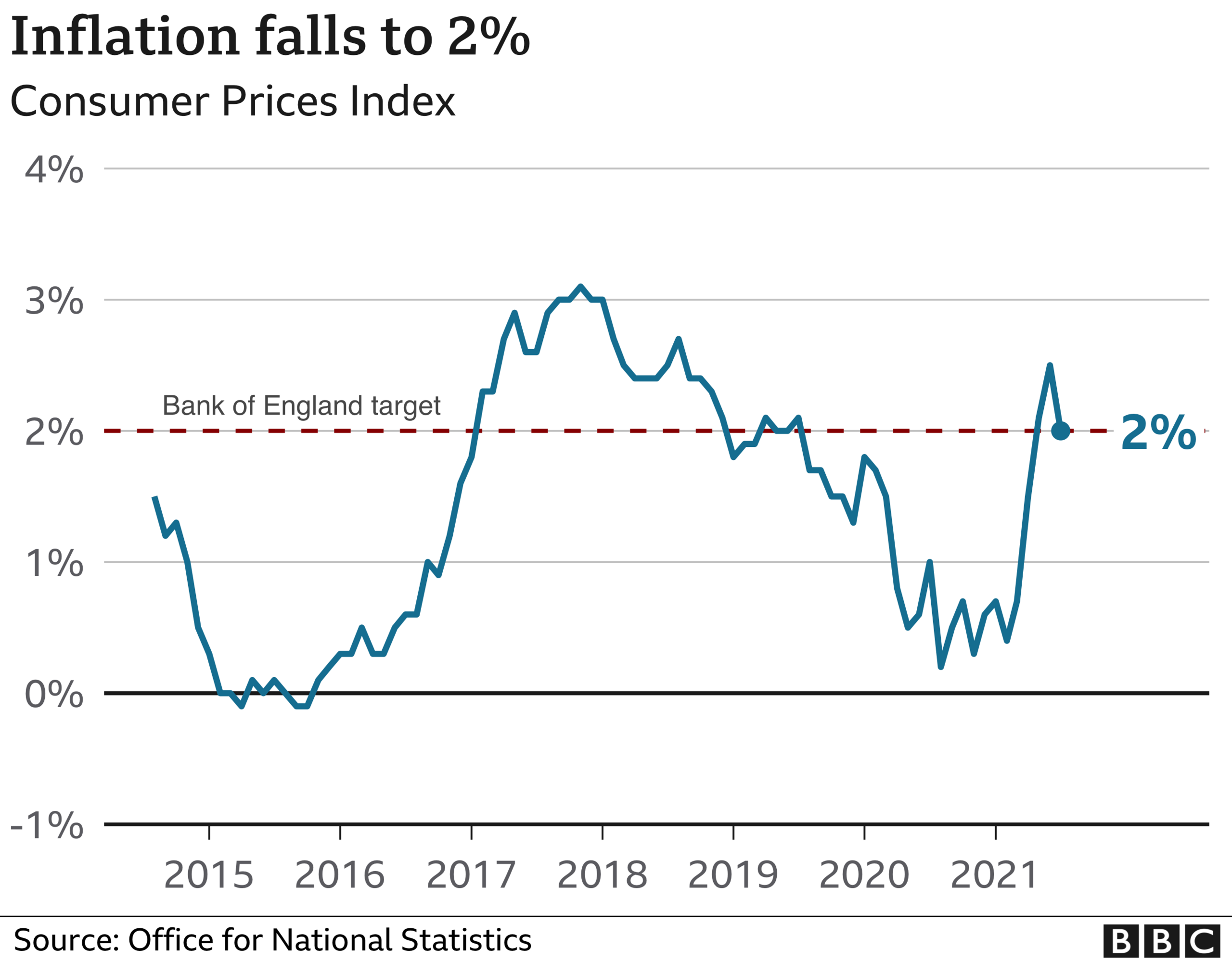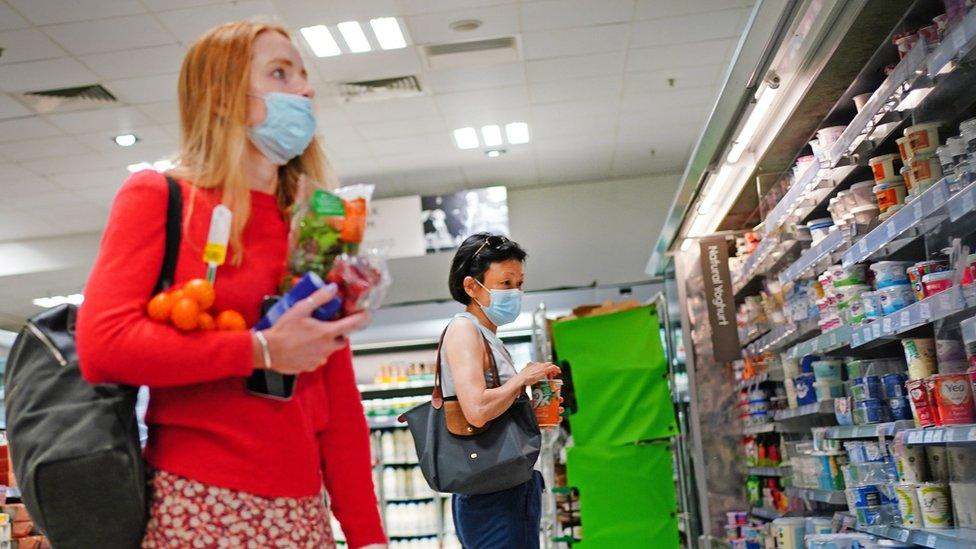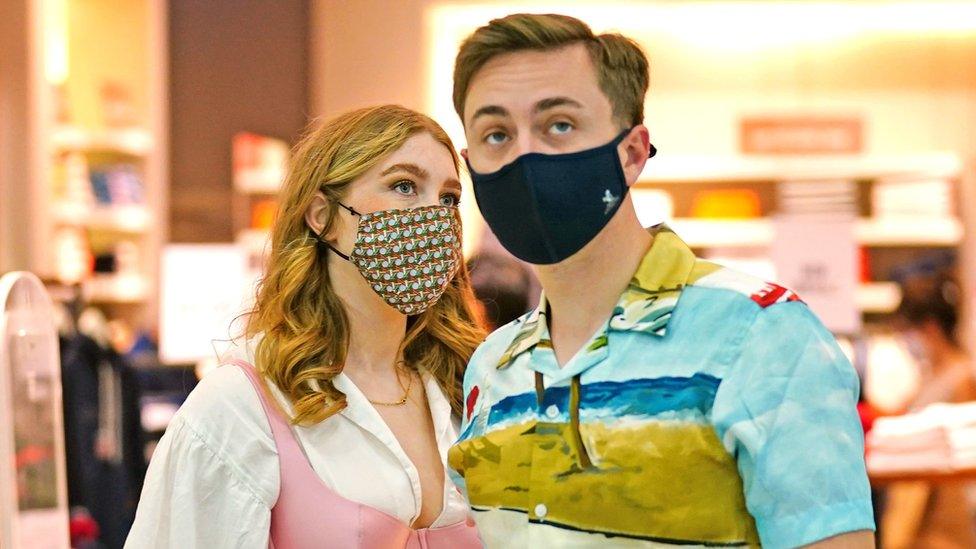Price rises cool amid clothes and shoe discounting
- Published
- comments

The UK inflation rate fell to 2% in the year to July as the economy continued to reopen from Covid-19 restrictions.
The Consumer Prices Index (CPI) measure of inflation dipped from 2.5% in the year to June, the highest level for nearly three years, the Office for National Statistics (ONS) said.
The rate fell to the Bank of England's 2% inflation target, after being higher for two months in a row.
The dip in inflation was driven by price falls in clothing and footwear.
Prices of games, toys and hobbies were also down and package holidays fell slightly compared with a year ago.
However, those decreases were "largely offset" by price rises in transport, the ONS said.
Average petrol prices stood at 132.6p per litre in July 2021, compared with 111.4p per litre a year earlier. The latest price is the highest recorded since September 2013.

What is inflation?
Simply put, inflation is the rate at which prices are rising - if the cost of a £1 jar of jam rises by 5p, then jam inflation is 5%.
It applies to services too, like having your nails done or getting your car valeted.
You may not notice low levels of inflation from month to month, but in the long term, these price rises can have a big impact on how much you can buy with your money.

Liz Martins, UK economist at HSBC, told BBC Radio 4's Today programme that experts were expecting the annual inflation to decrease a little, but added the size of the fall was a "a bit of a surprise".
"Today's figure puts the brakes on those who argue that inflation is about to go out of control, but there are reasons to think it does go up further later in the year," she said.
Ms Martins said the reasons for the dip in inflation were "quite broad based", but added the main contributors were "good sales" in the clothing shops over the summer, as well as a year-on-year fall in the prices of computer games and food.
However, she said there were still expectations that inflation would rise later this year. The temporary VAT cut is going to be removed for hospitality, we've got some inflationary big energy bill hikes coming.
"So we do think inflation could go up towards the end of the year and then come back down again around the turn of the year and into next year."

Regulator Ofgem has said the price cap for default domestic energy deals would be raised to cover suppliers' extra costs, with typical gas and electricity bills likely to rise by £139 to £1,277 a year.
July's CPI figure was below most economists' forecasts of an increase of about 2.3%.
Though falls in the price of clothes drove down the inflation, it was partially offset by recent rises in second-hand car prices, the ONS said.
Second-hand car sales in the UK have more than doubled in the last few months as a result of a delays in the supply of new cars, caused by the shortage of semiconductor chips used in their production.

Samuel Tombs, chief UK economist at Pantheon Macroeconomics, said usually, a seasonal jump in transport prices was countered by a big drop in clothing prices.
"Stepping back from the detail, the big picture is that July's drop in CPI inflation will be short-lived," he said."The headline rate will rise to nearly 4% by the end of this year."
However, Mr Tombs said with energy prices "unlikely to soar indefinitely", and wage growth to be dampened when the furlough scheme ends, inflation would return to 2% by the end of 2022.
Inflation pressures
Yael Selfin, chief economist at KPMG UK, said the rate dip "masks the strength of inflationary pressures currently within the UK economy".
"We expect inflation to accelerate further during the rest of this year, rising significantly above the Bank of England's 2% target, as supply chains remain under strain faced with a strong rebound in demand," she added.
The Retail Prices Index (RPI), a separate measure of inflation, increased to 3.8%. The number in July is typically used to calculate rises in regulated rail fares.
However, the government said no decision had been made on national fares, with a spokesman stating it is "considering a variety of options".


Inflation pauses for breath
As the economy reopens, economic figures are disco-dancing in seemingly random directions.
Inflation came in lower than expected, bang on the Bank of England's target of 2%, thanks to a fall in the price of clothing.
But some of the comparisons reflect last year's reopening trends, for example in July 2020 clothes prices did not fall, as is usual during the sales.
Some prices are difficult to calculate, such as package holidays.
Other prices are still surging, such as the used car market, when in July the 12-month inflation rate was 14%, reflecting shortages of new cars due to difficulties in semiconductor production. Petrol prices are well up on a year ago too.
So the broad story is that this is a pause for breath as inflation marches towards 4% this year.
But the fact it has dipped provides more support for the majority of Bank of England decision makers on the Monetary Policy Committee who believe that the anticipated rise will be temporary and does not need an immediate response, in order to contain it.

- Published13 July 2021

- Published14 July 2021
